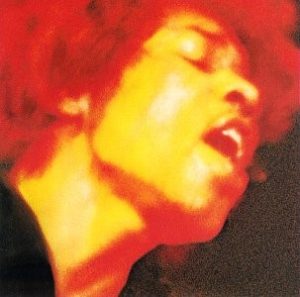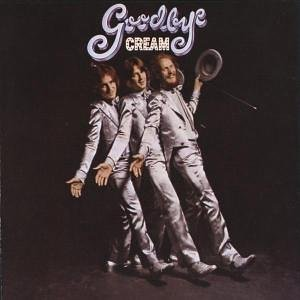Bernie Langs
I came to musical awareness at age five in the early 1960s when my parents played records on our home “hi-fi” system featuring the mellow folk songs of The Kingston Trio and The Tarriers, as well as soundtracks of their favorite Broadway musicals. Like many children and young people at the time, my interests in popular music shifted direction forever when the 1964 British Invasion led by The Beatles and The Rolling Stones took America by storm. In three short years, the music would exponentially grow increasingly complex and innovative and by decade’s end, the power of recorded music seemed to have infinite possibilities.
Jimi Hendrix is rightly considered a musical genius who expanded the possibilities of what the electric guitar could deliver in the dexterous hands of a Stratocaster-wielding, guitar-burning, psychedelic sage. His 1969 unaccompanied rendition of “The Star-Spangled Banner” at the Woodstock Festival is worthy of an essay of its own as an awe-inspiring performance of America’s national anthem, punctuated by the violent wails and mayhem of Hendrix’s guitar recreation of “the bombs bursting in midair.” That moment in music history might also be considered an emphatic, full stop end to that infamous decade of political, cultural, and social upheaval.
My favorite solo on an album by Hendrix appears on the double LP, Electric Ladyland released in 1968. “Voodoo Child (Slight Return)” is performed by his power trio, the Jimi Hendrix Experience, and is the last track on the last studio album recorded by the group. Hendrix died of a heroin overdose eleven months after Electric Ladyland’s release. Several famous musicians and vocalists died young in the late 1960s and early 1970s soon after releasing an album. Such collections are often scrutinized as the artist’s “final statement.” Jim Morrison’s final track with his band, The Doors, on LA Woman, “Riders on the Storm,” is a chilling tale akin to a short story written by a Los Angeles-based mystery writer. With “Riders,” the listener is not quite sure if murder is imminent and all of Morrison’s details and observations are chilling. Morrison, the so-called “Lizard King,” sings melodically in a voice doubled on the recording by a quiet, eerie, rasping whisper:

Girl, ya gotta love your man
Take him by the hand
Make him understand
The world on you depends
Our life will never end
Gotta love your man, yeah…
Morrison quit The Doors after recording LA Woman and it sounds as if he is bidding us adieu on “Riders” with his trademark emotionally detached intonations and poetry. He’d be dead in a bathtub in Paris within three months of the LP’s release.
Hendrix masterfully produced Electric Ladyland, and to realize the sheer sonic power and experience the full force of “Voodoo Child (Slight Return),” it is advantageous to listen with headphones either relaxed with eyes shut or in repose in the dark. Guitars swirl magically around the inner recesses of the mind as Hendrix solos, abbreviated chords and notes bouncing ear to ear, and somehow up and down, north to south, heaven to Earth. Hendrix’s guitar boasts perfected distortion and he whammy-bars his guitar at times as if entering a realm far beyond the daily pale.
One might speculate that Hendrix is prophesizing his approaching demise and worldly departure, yet the song is in no manner equivalent to, say, the pained vocal expression of imminent suicide by Kurt Cobain on Nirvana’s final track, “No Apologies.” Hendrix sounds like the liberated soul he’d always been as a musician and is now taking it one step further towards the beyond. It’s as if he’s declaring potential freedom from the body with exuberance, and with a chuckle to boot (observe his slightly self-amused delivery of the utterance, “uh”):
If I don’t meet you no more in this world then, uh—
I’ll meet ya on the next one
And don’t be late!
Don’t be late!
In nearly all interviews with Hendrix filmed in the 1960s, he sounds positive, optimistic, energetic, and impassioned about life and music. To lose him to heroin is a crime and a shame. I wouldn’t define his death by overdose as a plea for help or an expression of life’s futility, akin to the depressive circumstances surrounding the death of Brian Jones of The Rolling Stones in 1969, who drowned while “inebriated” in his swimming pool. I would never condone the motto “live fast, die young.” I see Jimi Hendrix as a loving individual whose drug use ended up robbing his listeners, family, and friends of his presence and art. Listening to the lightning fast, electric runs on “Voodoo Child,” the fiery notes akin to brilliant white-hot sparks of ideas, one mourns what might have been had he not left us so tragically soon.
Speaking of power rock trios and speed of light guitar licks, the solo by Eric Clapton on “I’m So Glad” appearing on 1969’s Goodbye Cream, is my absolute favorite rock solo. Goodbye was the band’s fourth and final album and the first three tracks on it are live recordings from appearances by the group in 1968. In filmed interviews for the 2012 documentary Beware of Mr. Baker, director Ray Bulger’s first questions to the intense virtuoso drummer of Cream, Ginger Baker (d. 2019) is along the lines of “What did you, Jack Bruce [bassist; d. 2014] and Eric Clapton have in common that made Cream so unique?” After ridiculing the stupidity of the question, Baker, who lived his life in a state of constant furious and bitter anger, shouts out, “Time!” and expounds on how each was blessed with an internal “gift of time.”

“I’m so Glad,” the nine minute-plus first track on Goodbye, has from my first listen as a twelve-year-old seemed impossibly conceived, since the manically paced guitar solo by Clapton, with his improvised diversions, long, short, soft, or loud, are met instantaneously by mirrored extrapolations on his themes by both Baker and Bruce. Cream metamorphosizes as the song progresses into a three-headed, blindfolded monster sharing one brain as they wildly engineer a locomotive traveling at rocket speed. Bands such as The Grateful Dead, who also played “telepathically,” would nod and smile at each other as they engaged in their musical universe of magic. When viewing the films of Cream, this trio of British chaps rarely glance at each other (with the exception of the 2005 reunion concert filmed in London where there are many lovely moments of endearing nods and smiles) and Bruce often plays with his eyes closed. Cream had the unity and mindset of the best of live jazz improvisation, and it is no wonder that Baker always referred to the group as a jazz band expressing the blues rather than a rock band of any kind.
There are so many fabulous solos in rock music history, including Jimmy Page’s brilliant work on “Stairway to Heaven” (1971), Pete Townsend’s powerhouse performance of “Young Man Blues” on The Who’s Live at Leeds album (1970), and Alvin Lee with the band 10 Years After performing “I’m Going Home” at Woodstock. When the era of rock and roll guitar “gunslinger” soloing peaks in the 1970s, the technical speed of, for example, the finale of Lynyrd Skynyrd’s “Free Bird” (1973), feels as if the manic virtuosity is for the sake of itself with no meaning except to dance about madly at a concert or listen to while downing multiple brews at a bar. These purposeless solos epitomize the downright ignorant slogan, “Sex, drugs and rock and roll.” Party on, Wayne!
Talents such as Jimi Hendrix, Jimmy Page, George Harrison, Peter Townsend, Buddy Guy, Jerry Garcia, Carlos Santana, Jorma Kaukonen, and Jeff Beck (who remains defiantly in a league of his own to this day) speak to their audience by communicating through their guitar phrases a vital expression of an inner state conceived and channeled through uniquely beautiful music. These artists and many others brought rock and pop music into the realm of joyful experience and created a newly found category within the arts, discovering a space where complex ideas and emotions find an overwhelming mode of powerful expression.
